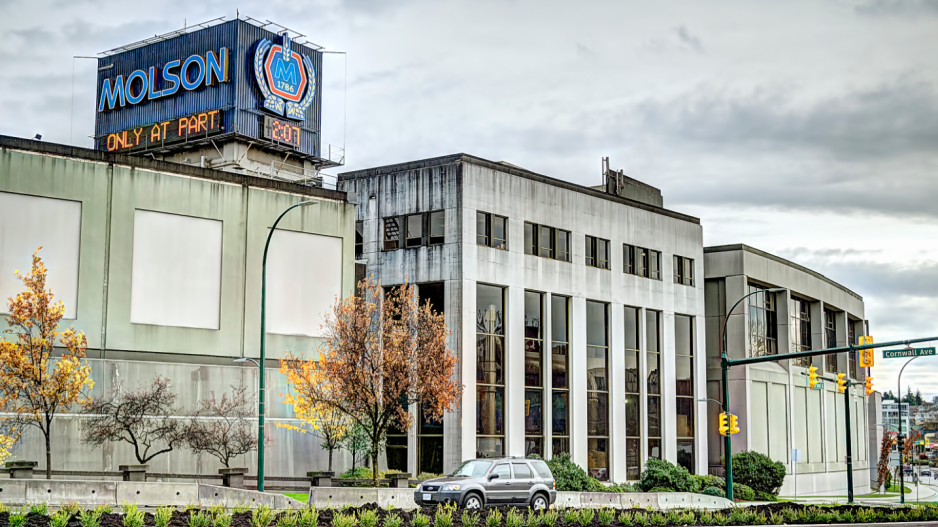With the number of downtown assets on the block this fall, competition for Vancouver real estate was bound to be hot. And it’s not just the cash-rich coffers of pension funds that are fuelling the action; it’s also savvy lenders who see a chance to reap a nice margin on their money.
Burrard Street has been the epicentre of the sales action this fall, with landmarks including Bentall Centre and Royal Centre listed for sale. The offerings follow the sales earlier this year of the Hyatt Regency Vancouver and the Fairmont Hotel Vancouver, for $140 million and $180 million, respectively. Meanwhile, at the south foot of the Burrard Street bridge, the Molson brewery is rumoured to have sold for approximately $185 million – many times its assessed value of $34.2 million.
The high valuations seen this year, and expectations for premium pricing of the assets yet to sell, have been possible thanks largely to aggressive lending practices by new entrants to the market, said Amar Nijjar, vice-president and practice lead of debt capital markets for Jones Lang LaSalle in Toronto.
“These deals have been possible not because the owners had all this cash to place, but because they were able to get very attractive financing terms,” he said of the two hotel deals.
Deals for the two properties were backed by money from foreign lenders, each approaching $100 million.
“One was done by a U.S.-based lender, and the other was done by a European lender, and they were both very attractive in terms of certain features such as interest-only as well as some very attractive interest rates,” Nijjar said. “Historically, up until 12 months or 18 months ago, it was very difficult to get that kind of money … on hotels, even though they were trophy types of hotels.”
While the Vancouver market is traditionally a safe bet for investors because of its stability and the rarity of opportunities to buy in, returns are also more promising than in less lustrous markets. Vancouver isn’t just solid; it’s sparkling, drawing in lenders such as AIG (Nasdaq:AIG), Pacific Life Insurance Co. and others.
“The needle has really moved as a result of interest in financing Canadian assets by these foreign lenders,” Nijjar said. “They’re looking for diversification, but they’re also looking for a certain enhancement of pricing vis-a-vis their local markets.”
This has given buyers the means needed to compete for ownership of properties, in turn pushing asset values higher, while enticing vendors such as Ivanhoé Cambridge (owner of Bentall Centre) and Brookfield Real Estate Services (owner of Royal Centre) to list their properties.
“Part of the reason that some of the larger assets have been coming to the market is because debt is so abundant and so cheap,” Nijjar said. “You can leverage and you can debt service because now there is so much more creativity around the underwriting.”
Just what kind of a difference has it made?
Carrie Russell, managing director of valuation firm HVS Canada, told an industry gathering in September that a realistic capitalization rate – a proxy for the anticipated return – for a downtown Vancouver hotel might be between 5% and 7%; by contrast, both the Westin Bayshore and the Fairmont Hotel Vancouver sold at cap rates of approximately 2.3%.
The action seems set to continue as long as the money keeps flowing, and with no meaningful rise in interest rates on the horizon, the band may well play on.
“Yes, money is cheap, but it’s a very classic supply-and-demand situation where there’s a lot of capital chasing very few assets,” observed Maury Dubuque, managing director of Colliers International. “There are some challenges, but it doesn’t seem to be holding up a lot of the larger deals that are happening downtown.”
Consensus seems to hold that any rise in interest rates won’t occur before late 2016, and so long as prices remain in line with expectations – and due diligence – transactions will continue to close.
“We don’t see any substantial change going into 2016,” Dubuque said. “There is no lack of appetite at this point for quality assets. … [The deals] are all for irreplaceable, trophy properties, so we don’t subscribe to the view that they’re overpaying. No one’s overpaying.”




